Sexism, Racism, & Ageism in Digital
We all know digital marketing is an exciting, fast-moving, and extremely results-oriented industry. Generally, it has less bias and discrimination than many other industries. However, despite the progressive nature of digital marketing, disparities remain.
Workplace issues relating to sexual orientation, gender, race, etc., tend to not be as pronounced. Studies have shown that younger generations are more accepting of people different from themselves, and the digital industry skews younger. However, remnant underlying discrimination and historical bias still persist. And, even if they don’t overtly exist, there may be underlying factors that influence hiring, promotion, and compensation practices.
Below, I examine sexism, racism, and ageism as it relates to our industry and Nebo. My goal is to have a conversation about what we’re doing right and what we can improve in an unvarnished and honest manner.
Sexism
Currently, women in the U.S. are paid $0.77 for every dollar a man makes. In our industry, the numbers aren’t much better, with women making $0.83/1.00. What makes these numbers so surprising is the fact that the ad industry is predominantly female.
The national workforce composition shows that women make up 47% of the workforce while holding 29% of executive / senior level positions.
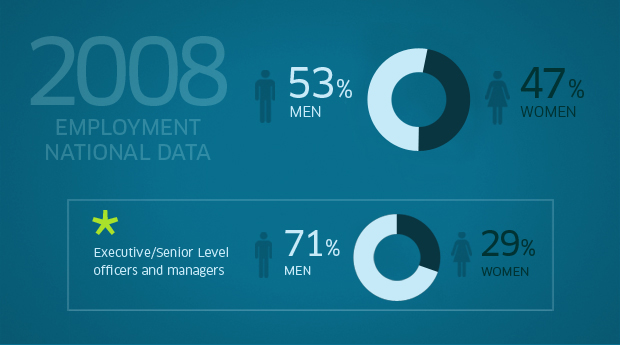
In contrast, the ad industry is 55.9% female. Yet only 39.9% of women hold jobs on the executive / senior level, with most holding sales and clerical positions.
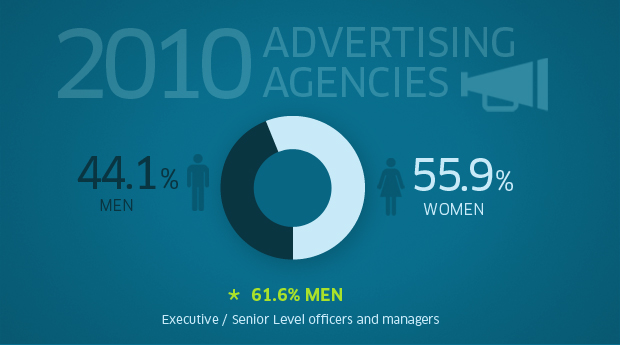
Sadly, our seemingly progressive industry isn’t much different than the rest of the world. Too often we allow stereotypes to influence job roles. The PR woman. The SEO guy. The non-American .NET developer. The white male PHP developer.
I’ve had someone question a hire we’ve made saying, “Women can’t code.” Our Director of Web and Application Development is a woman. If we had allowed ourselves to be influenced by this particular nasty stereotype, we would have missed out on one of our best employees. I used to be a programmer, and she could run circles around me, even when I was at my peak.
The SEM industry is dominated by men; however, our SEM team is led by talented and driven women. Under their leadership, we’ve received dozens of accolades, have grown every year of our existence, and have been ranked the top SEO firm in the industry 2 of the past 3 years.
I’m not saying this to get a pat on the back, or to cheerlead Nebo. I’m simply making the point that we should all work to avoid stereotyping candidates. It might have been easier to let stereotypes influence how we hired, promoted, and grew our team, but our team would have been worse off for it.
The influence of stereotypes can be especially damaging early in people's careers when they are trying to embark on their initial journey. Too many talented women are sent in a client-facing direction. Shortsighted managers judge their looks first or assume they should be in a stereotypical career role before they delve into their intellect, capabilities, and interests.
I consider myself a feminist. That said, I know I’m flawed and have said and done many insensitive things over the years. I’m on a journey to grow, learn, and evolve. I don’t expect to be perfect or expect Nebo to have perfect gender equality, but I do aspire for us to get as close as we can.
As it stands right now, women at Nebo make 1.79% more than the men at Nebo. However, this fluctuates as our team changes. Our goal isn’t simply to employ overall equal pay, but rather, to provide equal pay for equal work (i.e. equal opportunity and equal choice).
Racism
I remember as a kid playing sports and competing in other team environments, wanting to be on the most talented teams – the winning teams. No one cared about race. When you’re 12 you just want to win the game. Play with your friends. Get better and have fun.
Unfortunately, minorities still aren’t afforded the same opportunities as their Caucasian counterparts in the work force. I’ll be the first to admit that our industry has a lot of work to do here.
Ad agency labor force composition is 67% White and 23% Minority yet minorities only make up 11% of executive and senior level positions.
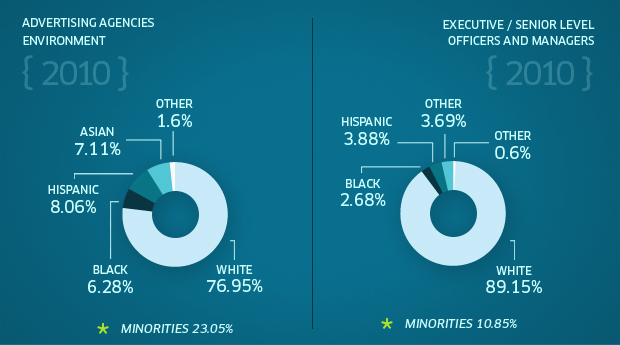
Disparities prove to be greater nationally despite the large gaps in ad agency labor presented above. National data shows a labor force composition that is 66% White and 34% Minority, however, minorities only make up 12% of all executive and senior level positions.
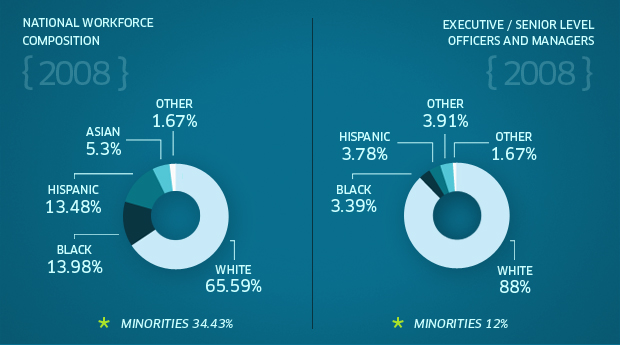
The racial imbalance isn’t usually due to overt racism. And it’s not just related to stereotypes. In many cases, it starts much earlier - in primary school throughout college.
Unfortunately, many minorities (and Americans in general) aren’t getting science and technology educations.
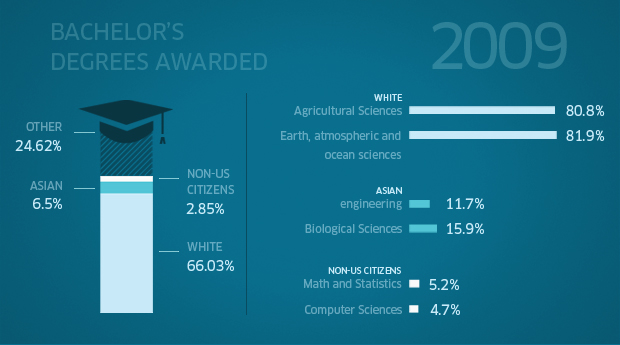
While our industry might not be able to fix the broader societal educational issues, we should strive for change nonetheless.
Let’s start with Nebo - I would give our company a “C” on our racial hiring and promotion practices. It’s not that we discriminate – we don’t. It’s not that we don’t give equal hiring and promotion opportunities – I believe we do. We hire and promote the best people, period.
But simply hiring the best people is not enough. Our team consists of about 20% minorities, which probably reflects the numbers in the general pool of resumes and applicants we receive. Along with many other digital firms, Nebo needs to ramp its recruitment of minorities. This is especially important as potential employees begin their careers.
As I confessed above, we have a lot of work to do here. This post isn’t meant to be a one-way conversation. I want others' ideas and thoughts. Like any competitive environment, we want to hire, retain, and promote the best people. What is your company currently doing to improve this racial employment gap?
Ageism
Ageism is the elephant in the room regarding discrimination in our industry. The digital industry skews young. This leads to younger applicant pools and discourages older, more experienced professionals to make the career jump into digital. However, not hiring and recruiting older employees is inherently destructive. Senior employees bring years of knowledge, experience, and intuition to the table.
Age skews younger in computer systems, design, and advertising when compared to employment across all industries combined.
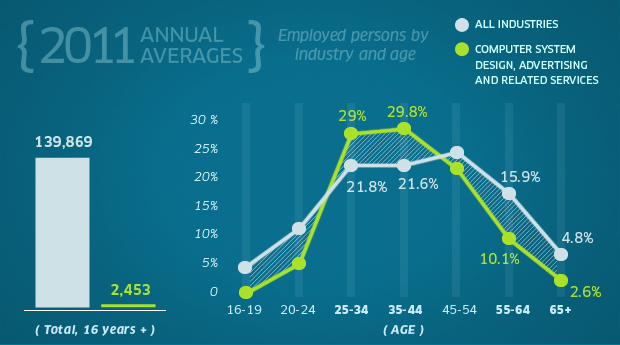
10 years ago, while working for a former firm, I had my first glimpse at age discrimination.
At this firm, I saw ageism aimed at the young and old alike. However, this case is in reference to an older applicant. We were hiring a Director of Business Development for the U.S. office, and a Senior VP from the corporate headquarters in Europe was in town to interview candidates. He took one look at the well-dressed, assumedly well-qualified applicant in the lobby and announced, “I’m not interviewing this guy.”
“Why?!” I asked. Bluntly, in front of 2 or 3 others, he replied, “He’s too old.” One of the senior members of the U.S. staff quickly said, “You can’t say that!” But it didn’t matter. The gentleman was interviewed by 2 of the 3 team members, but not the VP. He didn’t get the job.
6 months later, after hiring a younger sales manager, our sales started tanking and heads rolled – just not the Senior VP’s.
Imagine if it was Steve Jobs applying for a senior digital creative position. Any firm would've been kicking themselves had they judged him by his age and assumed he didn't get digital.
Similar to my views on our hiring and promoting practices on race, I’d give Nebo a “C” here, as well. We have a very young team. We feel we give equal opportunity to the applicants and resumes we receive, but we also need to do a better job of recruiting those with more experience.
Additionally, we need to work even harder to make Nebo an environment in which more experienced professionals can see themselves growing and thriving. We’d be foolish not to bring on driven and experienced resources to help take our team to the next level, as any firm would.
However, the sad truth about ageism, at least in my experience, is that it’s the one discriminatory practice people are least afraid of practicing openly. You’re much more likely to hear someone say a potential candidate is too old or too young for the job than ‘not the right gender’ or ‘not the right race’.
The funny thing is that we all get old, so why wouldn’t we want to set up environments where we could flourish throughout our careers? Why wouldn’t we want to tap into the wisdom of the previous generations? Why wouldn’t we want to create corporate cultures that got the best of people throughout their lives?
Summary
Our industry is doing better than average when it comes to discrimination, but we’re not doing enough.
The best firms work hard to not only hire the best applicants, but also to ensure they’re recruiting from broad, diverse pools. As we were doing the research for this post and examining our own team, recruiting practices, and work environment, we realized we simply couldn’t just comment on the subject. We need to make changes.
So, we’re starting two separate initiatives:
-
- We’re instituting a minority recruitment program starting with broadening our college recruitment. This will be an evolving program, and it will also include a qualitative research component so we can do more than drive resumes. It will help us uncover insights to make meaningful changes to our hiring, promotion, and retention practices.
- We’re undertaking a study to help us better understand and create programs to engage and recruit more experienced employees. This one is more complicated in my view. The more experience someone has in a particular field, the less likely they are to make an industry shift. Hence, you end up with a cycle that perpetuates ageism, even if it’s not intentional. Regardless, we’re going to study the situation and implement change.
As I mentioned before, I've said and done many insensitive things over the course of my life and career. Frankly, we all have. No one is perfect, but we should all try to grow, evolve, and change.
One of the goals of this post was to spark conversations about what we’re doing right and wrong as an industry. We understand we can't change things overnight, but we're hoping an open discussion will educate, inspire, and provoke change down the road. We encourage you to share how you feel about this topic. What is your organization currently doing to improve discrimination or promote fair pay? What are some of your thoughts and ideas? Feel free to join the conversation on our Facebook or Twitter pages.

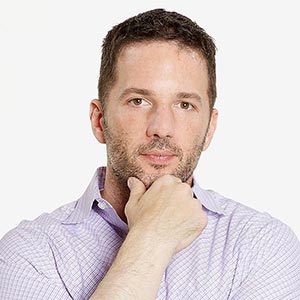
Comments
Add A CommentBelated thanks for this excellent post, Brian! I became aware of it through a link from this week's Gen Z post. This may be an oldie, but it's definitely a goodie.
There are other things QuotesChimp should look at. One is the ease of making claims. Some companies make the filing of claims easy by making access to adjusting services readily available in most neighborhoods. Others make processing of claims more difficult, so be sure to ask how each company handles this all-important aspect of the insurance relationship.
I am a web application developer in my 50's, that graduated with a degree in CIT a year ago. Age discrimination is the biggest problem I have when interviewing for a job. I have been hired for two internships, and have been working full time as a developer for the past year. All of my successful hires have happened with interviewers over the age of 30. With interviewers under 30, I have totally struck out. In my former profession as a manager, I hired hundreds of people. I know all of the tricks of interviewing, and I can tell when I am being discriminated by a narrow minded interviewer.
I actually earned my associates degree twenty years ago in CIT, but did not pursue a career in IT because of the difference in the salary I was earning at the time and the average salary of a programmer. That did not keep me from writing my own programs for use in my former career and building websites on the side. I have always had a passion for programming. Once my kids graduated from college, and on their own, I took the plunge and earned my bachelors. But I have this 800 pound gorilla to contend with, in the attitude that older people don't get information technology!
I like your comment about tapping into the wisdom of the previous generations. In order for an industry to go foreword, they should know where they have been, the good and the bad.
This is definitely a good topic to bring to the blogosphere! There are several strong demographic trends that seem to naturally occur, not just in digital/computer system design/advertising/etc but across the array of career industries. Sexism has been faced in every industry since the dawn of time and has gradually made progress to bring both genders closer and closer to a more level playing field. Given the variance in job requirements etc, I believe that change will come at different rates (although individual efforts in the matter will have great impact).
Also, from a business management stand point, it leaves one to wonder if the "glass ceiling" effect, which expresses the income barrier between men and women, will ever completely level out. Gradually, companies are facing the realization and understanding that females can be just as qualified for a position that has been traditionally held for men.... and at a lesser rate of pay. Less expenses and the same, or greater revenue. I am clearly hoping this will not be the case.
Racism is a topic that surfaces frequently in a country with a history like ours and such a great melting pot. Provided the variety of cultural beliefs and traditions, I feel there will naturally be industries that see a stronger or lesser influence from certain races (and even genders for that matter). As a very small scale example that covers both demographics, while working with my current employer, with whom I've been for a year, I have come to recognize patterns that frequently *but not always* show up first hand. Although times and the technology world change, cultures remain the same and have the male head of the house that acts as the strong figure who is the sole income provider for the household and is the main source of contact when in public. I suppose some aspects of gender and race based trends found across ALL industries will be naturally occuring.
You were pretty spot on with the ageism issue! It's definitely a big problem just the same yet many people don't see it as such and may be more open about their opinion in this area more so than the others. I think that effort to adjust, or at least understand, this stereotypical misconception is fantastic. The digital media appeal more than likely swings toward the younger crowd because it is a very, VERY new form of business that this generation was born into using daily and in some cases relying on. That being said, I still dont see where the experience, knowledge, and expertise of older applicants cannot be incredibly useful. Again from the business management perspective, I dont know if maybe such a VP like that would see the applicant as maybe retiring sooner than the company desires and therefore not consider interviewing him.... but if a more experienced applicant can bring you a stronger ROI and in a shorter time than a younger applicant, wouldnt it be beneficial to look into what he has to offer?
Overall, great post!
Exposure
As you mentioned in the article, exposure is key. For me, I had always been interested in technology. I still remember my first night getting online after the AOL diskette came in the mail and staying up until 2 in the morning surfing the web. In the late 90’s, I saw what was going on in Silicon Valley, and saw, as connection speeds increased, how much more robust websites became. Then seeing how the sites were being bought for millions of dollars, I paid more attention to their revenue streams and business models. Being a Marketing Major, this seemed like a great field for me considering my marketing background and affinity for the web, and web related technologies.
I am not sure where I would be if my Dad did not allow me to use his credit card that night. Being exposed to something at that age, provided the spark for me. What is missing for a lot of African American kids and other minorities, is that exposure and access. I have mentored a few individuals in the past through professional organizations, and I am glad to say that I helped along or exposed individuals to the online industry as a viable career opportunity. But there is still a lot of work to do.
Again, exposure and access is a key. But it is only a part of the equation. As you mentioned, organizations need to start looking outside of their own social circle, especially if they do not have a diverse social and professional circle. We also make the assumption that we live in a meritocracy. Who you know, can definitely be a lot more important than what you know. And if you only know people that "look" like you, then this contributes to the problem.
I also believe that this discussion is not just about meeting a quota. This is about being able to create an atmosphere where different perspectives are taken into consideration. Many times I have walked into client meetings where everyone is of the same gender, ethnic, or socio economic background. Diversity in thought and experiences is key to be able to provide the best solutions, or at least to have the most fruitful dialogues. Being 1-sided will only help you to solve the problem 1 way, or solve only part of the problem.
Great article, and if I have anything else to add, I'll chime back in. Also, let me know how I can help.
[Comment removed due to inappropriate content]
Most of the references we used were from official government sources like the US Department of Labor. We did have to combine various job codes for the the Digital Marketing Industry, as this specific code does not exist.
We also decided that the Advertising Agency Industry was the closest. In
terms of occupations, we had to create combinations of
what best describes what we do (e.g. "Marketing and Sales Managers" +
"Computer Programmers" + "Designers" + "Computer and Information
Systems Managers" + "Computer Scientists and Systems analysts, " etc).
I've listed some of our sources below:
SEXISM & RACISM:
http://www.bls.gov/cps/industry_age.htm
http://www.bls.gov/opub/ted/2011/ted_20110216.htm
http://www.bls.gov/opub/ted/2011/ted_20110914.htm
http://www.census.gov/compendia/statab/2012/tables/12s0616.pdf
http://www1.eeoc.gov/eeoc/statistics/employment/jobpat-eeo1/2010/index.cfm#centercol
http://www.workforce.com/assets/images/features/workforce_comp_100618.pdf
http://www.forbes.com/2010/08/10/most-popular-college-degrees-for-women-forbes-woman-leadership-education_slide.html
http://www.forbes.com/2010/08/10/most-popular-college-degrees-for-men-forbes-woman-leadership-education_slide.html
http://www.nsf.gov/statistics/wmpd/race.cfm
http://www.census.gov/prod/2011pubs/acsbr10-06.pdf
AGEISM:
US Department of Labor:
http://www.bls.gov/cps/industry_age.htm
We looked at the "Computer and Systems design and related Services"
and at the "Advertising and related services" Industries.
Brian, your comments were very insightful. I would be interested in knowing where the data for the info-graphics were derived.
While all of the post was thoughtfully composed. I find that there might be something missing when it comes to ageism and advertising. Your post made sense, but I feel that relative to the advertising industry the ageism issue might be more systemic than we can imagine.
Thanks again for sharing your thoughts.
Awesome post!
As a minority and recent college grad I can attest that I never had any exposure to advertising in school. I have a degree in business management, however my only courses on the subject of marketing were 2 broad elective classes and by the time I took those I had already declared my major.
I will take some of the blame for this however, because I never actively sought out advertising opportunities and I'm positive they aware available. But at the same time, it's not an option that is popular among minority students. Everyone knows about the stereotypical career paths: doctors, lawyers, scientists, etc. but I would consider advertising as one of those lesser known fields.
I agree with one of the previous posts. I would attempt to influence the young and undecided. College freshmen and even high school juniors and seniors who have no idea what they want to do are very impressionable. I would try to expose them to the industry and perhaps they'll find it to be something that excites them.
I found Your post is really interesting and very informative ... thanks for sharing it with us.
SixGun - Sounds like you didn't read the article and that you've already jumped to a conclusion that fits your pre-existing beliefs. In fact, it almost seems like you came here to make a political statement instead of talk constructively. If you aren't going to add to the conversation, then feel free to go elsewhere.
Minorities have had affirmative action since the 1960's.
Asians do just fine. They would do just fine without affirmative action.
Companies need the best people for the jobs. If certain minorities do not cut muster then that is the way it is. Allocating jobs on the basis of quotas is wrong; any other basis apart from merit is racist.
They say it is about anti-racism but in the end it is all about being anti-White.
Anti-racism is a code word for anti-White.
[Comment removed due to inappropriate content]
Jae - thanks for the feedback. I definitely agree. So far we've received many good ideas, albeit many have been sent via direct messages. Thank you taking the time to read the post and for sharing your thoughts publicly!
To hire more minorities, you have to encourage more minorities to apply and by exposing them to your firm's work and that opportunities in Digital Marketing / Advertising exist outside of just SEM.
I encourage you to setup and/or possibly co-sponsor a program where you educate high school and college students on the innovation and evolution of digital advertising from the ad agency, client, content and publisher sides.
Once more are aware of these opportunities, more will actively pursue career paths within this realm.
Lauren - thanks for your comments and I agree completely about veterans and people with disabilities. I also love your ideas about career fairs and conferences. Great feedback!
Thought the post was great...something obviously that more companies should be practicing in terms of their recruitment. I think that there are two other initiatives that can easily be integrated with your recruitment strategy when it comes to discrimination in the workplace: veterans and people with disabilities.
Something that you focused on briefly in part of this blog post was the extreme need for increased minority and gender representation in the STEM field. There are various outreach programs (conferences and diversity career fairs) that I've attended that have helped our initiative and I suggest starting there.
I think the best thing that you are doing is making the promise to dedicate time to college recruitment. It is important to get involved on campus with students coming out of college or still in college. One of the best ways I have seen this practiced is through companies sponsoring on campus clubs that pertain to their industry; and this is definitely something Nebo could do.
I think it's great that this is something Nebo is thinking about; spread the news!!